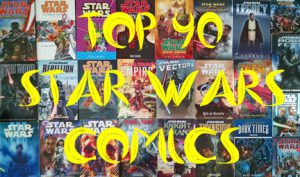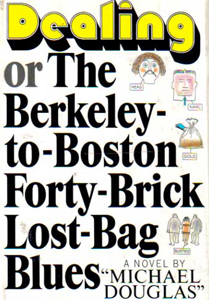“Dealing, or The Berkeley-to-Boston Forty-Brick Lost-Bag Blues” (1970) is Michael Crichton’s only collaborative novel (not counting the posthumous “Micro”), written with his brother Douglas (1948-2012) under the name Michael Douglas. They weren’t trying to hide the fact that it’s a pseudonym, as the cover puts “Michael Douglas” in quotes.
Capturing a lifestyle
Perhaps a pseudonym was used because it was controversial at the time to skewer the drug war, which was ramping up. Richard Nixon would officially declare a War on Drugs one year later, but already marijuana was illegal, thus making the events of this novel possible.
It’s difficult to guess who did what on this book. “Dealing” is not like any other Crichton novel. It’s written in the first person as Harvard student Peter Harkness travels from Boston to Berkeley and back again, ferrying 40 bricks of high-grade Mexican weed.

“Dealing, or The Berkeley-to-Boston Forty-Brick Lost-Bag Blues” (1970)
Authors: Michael and Douglas Crichton, writing as Michael Douglas
Genre: Thriller
Settings: Boston; Berkeley, Calif., 1970
Later, Douglas became a newspaper reporter and then the lead producer for the Financial News Network. So he might be responsible for the book’s macro analysis elements. But on the other hand, Michael did use a reportage style on “The Andromeda Strain” one year earlier.
Douglas dropped out of Harvard and moved to Montana to live a hippie lifestyle, so I’m tempted to see Peter as his stand-in.
However, “Dealing” isn’t written in a beat-poet, stream-of-consciousness style like the title hints at. It does effectively use language of the time such as “Far out” and “You dig?” The novel gets about 75 percent of the way toward immersion into the mid-level drug-dealing life.
By comparison, Philip K. Dick’s “A Scanner Darkly” – to be fair, published seven years after this – is a more emotional and humorous story while also skewering the drug war.
A broad picture
While “Dealing” doesn’t give a complete feel of the lifestyle, the broader picture is crisply illustrated, and it might’ve been more shocking in 1970 than it is today, when everyone on every side (except those making money off it) is tired of the drug war.
With marijuana legalization now sweeping the nation, we can hope this novel is someday merely a fascinating time capsule, but we’re not quite there yet.
The Crichtons show how every aspect of this industry grows from its illegality. This includes street-level dealings that are infused with an undertone of mistrust because someone could be an undercover cop, or they could turn in the other party if it serves their interests.
Also, the drug war creates corruption within police forces. This is personified by Lt. Murphy in Boston, who gets in on the action himself. At the airport, he nabs Peter’s girlfriend, who is transporting two cases of bricks from California to Massachusetts. But he officially reports only one of the cases, keeping the other for himself in order to make easy money on the street.

With this book’s Boston on my mind, I especially got a kick out of a line in the new “Spider-Man” movie when MJ wryly confirms to Peter that, yes, there is crime in Boston. So if he moves there, he’ll see plenty of crime-fighting action.
All-purpose protagonist
The first-person narration gives the reader an automatically close relationship with Peter, but he’s still often an all-purpose protagonist who experiences vignettes ranging from drug trips to a much more dangerous trip: He visits a go-between to re-acquire the stolen case.
Other characters float in and out, including Berkeley kingpin Musty, Peter’s not-always-trustworthy friend John, and Peter’s new girlfriend Sukie. The Crichtons might’ve been aiming for a ragtag adventure, but because they are both professional writers, “Dealing” ends up crisply plotted.
The conclusion calls out for a “Where are they now?” like from PKD’s “A Scanner Darkly” or the Stephen King movie “Stand By Me.” Instead, it ends with a successful mission but we don’t get further character interactions. The Crichtons are more invested in commenting on the situations than on the people.
“Dealing” is a good dirt-level perspective on the drug war from the dealers’ point of view. But despite its thoroughness, it doesn’t have any passages that will surprise you or stay with you.
Crichton fans should check it out, though, because it’s a fun oddity in his catalog. With the John Langes being reprinted in the past decade, “Dealing” is now the only out-of-print Crichton book. You can find original printings for as little as $10, though. Those will of course come with a musty 1970 smell built in – and that matches well with the time-trippy reading experience.

